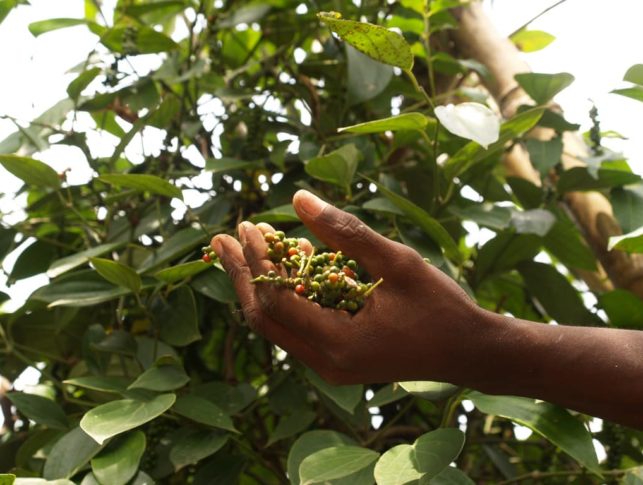Cameroon’s distinctive Penja pepper, hailing from the volcanic soil of the Penja valley, is the first African product to receive an internationally protected geographical indications label (PGI) by the African Intellectual Property Organization. Recognized by the European Union, the label awards the name of an area, a specific place, or in exceptional cases, the name of a country, as a description of an agricultural product or foodstuff. The product must be traditionally and at least partially manufactured within the region and thus acquire unique properties.
The Penja pepper, known for its bright, musky flavor, has become a prized spice used by Michelin-starred chefs around the world and fetches as much as USD$33 per 3.5 ounces. There is some confusion as to the origins of the pepper, some saying a farmer stumbled across it and gave it to his wife to plant, whilst others maintaining a French colonialist planted it on his banana plantation, but it is clear the white peppercorn rose to prominence through French entrepreneur Erwann de Kerros. Kerros came across a farm growing the pepper, in Cameroon, in 1992 and was astounded by its distinct flavor. He stayed in the region for four years before returning home to reveal the great qualities of the pepper. Today Kerros runs his spice company, Terre Exotique, with almost $10 million in revenue.
PGI Label Profits Farmers
The PGI label on Penja pepper has also helped the local community who farm it. The small town of Penja, and surrounding villages have been transformed by the localized Penja production. According to law professor Michael Blakeney, from the University of Western Australia, who has advised nations on intellectual property rights, there are huge economic benefits from the PGI label. You can charge between 8 – 10% more for a product that’s sold under the label and it protects rural economies: farmers stay where they are if their product is profitable, he said.
The label prohibits the products name from being used by producers outside of the region, just as champagne must be produced in the Champagne region of France and therefore means more work for the local people of Penja. Since the label was awarded in 2013, some 200 new farmers have taken up production, said pepper plantation owner Rene Claude Metomo. Many others have abandoned growing coffee and cocoa in favor of Penja pepper. Although there are some growers in Madagascar, Cameroon is the only country where it’s grown on a large enough scale to be reflected in export statistics.
Production on the Increase
Over the past five years, production of Penja pepper has increased more than fifteen-fold, according to Business Cameroon. In 2012, before the PGI label was awarded, production levels of Penja were at 18 tons per year, but in 2015 that figure had risen to 300 tons and continues rise. With around 60% of production consumed locally, the remainder is exported to the European market and chefs around the world are clamoring for more. New York City chef, Lior Lev Sercarz said he buys around 331 pounds of Penja pepper per year. It’s got herbaceous, grassy notes and doesn’t burn, he said.
Business Cameroon also reports that there are plans made by Swiss agro-food giant, Nestle, to use Penja pepper in their Maggi bouillon cubes. Maggi stock cubes, officially represents 90% of the production of the Nestle Cameroon factory, which supplies the whole CEMAC market – Cameroon, Congo, Chad, Central African Republic and Equatorial Guinea. The project would mean an increase in demand and production of Penja pepper, and a further boon to the local people of the area. Most of whom are farmers who would not be protected if it weren’t for the PGI label.
Penja pepper is one of three African products to be awarded the PGI label, along with Oku honey from Cameroon and Ziama Macenta coffee from Guinea. According to the general manager of the African Intellectual Property Organization Paulin Edou Edou, there may be six more African products with the PGI label in the near future. Only a few years ago the notion of intellectual property was unknown in the African continent, said Edou Edou. Now, countries are lining up to have products registered. With the success, Cameroon has seen with Penja pepper, it is easy to see why.

